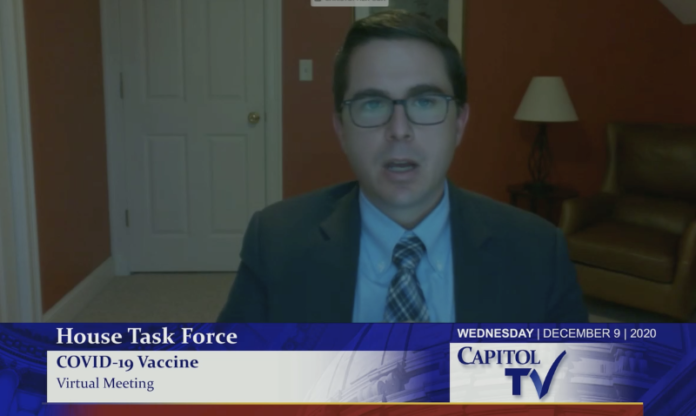
PROVIDENCE – Residents and staff members at nursing homes will be among the first people in Rhode Island to receive the coronavirus vaccine.
The state has opted into a federal program with the Department of Health and Human Services to work with CVS Health Corp. to distribute a COVID-19 vaccine to long-term care facilities and open on-site clinics to vaccinate residents and the front-line workers that care for them.
Christopher Cox, senior vice president for pharmacy operations at CVS, told lawmakers on the new R.I. House Task Force for COVID-19 Vaccine during a Wednesday meeting that 193 different facilities in Rhode Island will partner with CVS to administer the vaccine.
These facilities represent 45 skilled nursing homes, which account for nearly 5,000 beds. Cox said 148 of the 193 facilities include other types of assisted-living facilities and elderly homes, which account for nearly 6,000 beds across the state.
Cox said CVS will work with these facilities in advance of the vaccination, including receiving a roster of residents and staff members that plan to take the vaccine, and scheduling “clinic days” in which CVS staff members will travel to the facility and administer the vaccine.
Each facility will have about three on-site clinics, said Cox. The first is to administer the first dose, the second is to administer the second dose, and the third is to reach any patients administered into the facility between the first and second clinic to receive their second dose, as well as any remaining staffers.
These CVS staffers will be tested on a weekly basis, Cox said, and must adhere to strict personal protective equipment protocol, including face masks, shields, gloves and gowns – both of which will be changed between every single patient that is vaccinated.
It is unclear if CVS will look to hire any additional personnel in Rhode Island for this specific program.
Assuming that both Moderna and Pfizer Inc receive emergency use approval through the U.S. Food and Drug Administration, Cox said CVS will be able to handle distributing one or both types of vaccinations across the country.
Pfizer’s vaccine, which is likely to be approved for emergency use this coming weekend, must be stored in the “ultra-cold temperatures” of minus 94 degrees Fahrenheit (minus 70 degrees Celsius). Many labs, clinics and other health care facilities do not have these types of refrigeration units, so Pfizer developed a shipper, which will be able to store and transport the vaccine safely for up to 15 days as long as dry ice is replenished in the shipper every five days, said Cox.
He said CVS will store the vaccine in the shipper until the date of the clinic at the long-term care facility, then move it into a refrigerated tote, transport it with the pharmacists to the site of the facility, and ultimately administer the vaccine.
While Rhode Island has opted for CVS’ program, the state has not yet fully committed to setting a date of when to begin administering, said Cox. He said he expects the state to determine a date within the next 24 to 48 hours.
A spokesperson at the R.I. Department of Health was not immediately available to confirm if the state will set a date in Cox’s time frame.
When the vaccine is eventually available to the public, Cox said all CVS retail pharmacies will be able to store and administer any of the vaccine candidates after they are approved. However, appointments will be required and dates for the first and second dose must be made upfront, he said. Patients will not be able to take the vaccine if they have COVID-19 symptoms or feel ill that day.
Patients will receive the vaccine with a Band-Aid, similar to a flu shot.
“We expect it to be a very natural, normal process for the vast majority of our patients,” said Cox.
Alexa Gagosz is a PBN staff writer. Contact her at Gagosz@PBN.com. You may also follow her on Twitter at @AlexaGagosz.












